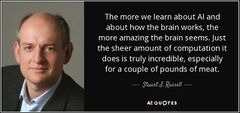Difference between revisions of "Stuart J. Russell"
(desc) |
m (Text replacement - "|image=File:" to "|image=") |
||
| Line 2: | Line 2: | ||
|name=Stuart Russell | |name=Stuart Russell | ||
|constitutes=computer scientist, author | |constitutes=computer scientist, author | ||
| − | |image= | + | |image=Stuart_Russell.jpg |
|description=Chatham House [[Artificial intelligence]] specialist | |description=Chatham House [[Artificial intelligence]] specialist | ||
|image_width=240px | |image_width=240px | ||
Latest revision as of 10:06, 17 December 2023
(computer scientist, author) | |
|---|---|
 | |
| Born | 1962 |
| Alma mater | Wadham College (Oxford), Stanford University |
| Member of | Chatham House |
| Interests | Artificial intelligence |
Chatham House Artificial intelligence specialist | |
Stuart Jonathan Russell OBE is a British computer scientist known for his contributions to Artificial intelligence (AI).
Stuart Russell is a Professor of Computer Science at the University of California, Berkeley and Adjunct Professor of Neurological Surgery at the University of California, San Francisco. Professor Russell holds the Smith-Zadeh Chair in Engineering at University of California, Berkeley, and founded and leads the Center for Human-Compatible Artificial Intelligence (CHAI) at UC Berkeley.[1]
Contents
AI textbook
Stuart Russell is the co-author with Peter Norvig of the most popular textbook in the field of AI: "Artificial Intelligence: A Modern Approach" used in more than 1,500 universities in 135 countries.[2]
2021 BBC Reith Lecturer
Stuart Russell will deliver the 2021 Reith Lectures on the theme "Living with Artificial Intelligence". Lecture 1 entitled "The Biggest Event in Human History" was broadcast on BBC Radio 4 on 1 December 2021.[3]
The four lectures will examine what Russell will argue is the most profound change in human history as the world becomes increasingly reliant on super-powerful AI. Examining the impact of AI on jobs, military conflict and human behaviour, Russell will argue that our current approach to AI is wrong and that if we continue down this path, we will have less and less control over AI at the same time as it has an increasing impact on our lives. How can we ensure machines do the right thing? The lectures will suggest a way forward based on a new model for AI, one based on machines that learn about and defer to human preferences.
The series of lectures will be held in four locations across the UK: Newcastle, Edinburgh, Manchester and London and will be broadcast on BBC Radio 4 and the World Service as well as available on BBC Sounds. Accompanying the lectures, Adam Rutherford and Hannah Fry will explore the themes of the lectures in a complementary BBC Radio 4 series.
The lectures will be chaired by presenter, journalist and author, Anita Anand.[4]
Transcript of Lecture 1
The 20-page transcript of Lecture 1: "The Biggest Event in Human History" is here.[5]
Events Participated in
| Event | Start | End | Location(s) | Description |
|---|---|---|---|---|
| WEF/Annual Meeting/2016 | 20 January 2016 | 23 January 2016 | World Economic Forum Switzerland | Attended by over 2500 people, both leaders and followers, who were explained how the Fourth Industrial Revolution would changed everything, including being a "revolution of values". |
| WEF/Annual Meeting/2017 | 17 January 2017 | 20 January 2017 | World Economic Forum Switzerland | 2950 known participants, including prominently Bill Gates. "Offers a platform for the most effective and engaged leaders to achieve common goals for greater societal leadership." |
| WEF/Annual Meeting/2022 | 22 May 2022 | 26 May 2022 | World Economic Forum Switzerland | 1912 guests in Davos |
| WEF/Annual Meeting/2023 | 16 January 2023 | 20 January 2023 | World Economic Forum Switzerland | The theme of the meeting was "Cooperation in a Fragmented World" |
References
Wikipedia is not affiliated with Wikispooks. Original page source here